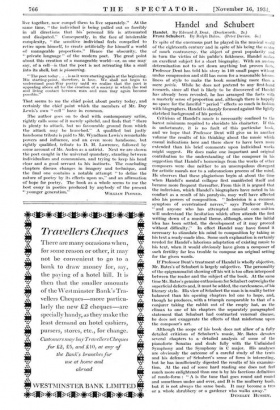Handel and Schubert
Handel. By Edward T. Dent. (Duckworth. 2s.) Franz Schubert. By Ralph Bates. (Peter Davies. 5s.) IN spite of the enormous part he played in the musical world of the eighteenth century and in spite of his being the centre of much controversy, the object of great popularity and in turn the victim of his public's fickleness, Handel makes an excellent subject for a short biography. With an austere determination not to set down anything but proven facts, Professor Dent has, told his story in 140 small pages without undue compression and still has room for a reasonable leisure. liness of style to make the book something more than a mere précis. While he does not pretend to any first-hand research, since all that is likely to be discovered of Handel has already been revealed, he has arranged the facts with a masterly sense of proportion and, although there is happily no space for the fanciful " period " effects so much in fashion with biographers, Handel is sharply focussed against the lightly sketched background of his period.
Criticism of Handel's music is necessarily confined to the barest minimum required to elucidate his chaiacter. If this is unfortunate, it is no fault of this particular book, and we hope that Professor Dent will give us in another volume' the results of his thinking about the music which casual indications here and there show to have been more extended than his brief comments upon individual works might suggest. He does make one important and original contribution to the understanding of the composer in his suggestion that Handel's borrowings from the works of other composers were due neither to an unscrupulous disregard for artistic morals nor to a subconscious process of the mind. He observes that these. plagiarisms begin at about the time when Handel's mental collapse first manifested itself and became more frequent thereafter. From this it is argued that the indecision, which Handel's biographers have noted in his conduct as a result of his paralysis, may well have affected also his powers of composition. " Indecision is a common symptom of overstrained nerves," says Professor Dent, " and anyone who has attempted musical corn aisition will understand the hesitation which ofteir attends the first writing down of a musical theme, although, once the initial idea has been settled, the development of it may proceed without difficulty." In effect Handel may have found it necessary to stimulate his mind to composition by taking as his text a ready-made idea. Some such explanation is certainly needed for Handel's laborious adaptation of existing music to his text, when it would obviously have given a composer of such fertility far less trouble to compose an original setting for the given words.
If Professor Dent's treatment of Handel is wholly objective, Mr. Bates's of Schubert is largely subjective. The personality of the epigrammatist showing off his wit is too often interposed between the'reader and the subject of the book. At the same time Mr. Bates's genuine enthusiasm for Schubert outweighs the superficial defects and, it must be added, the carelessness, of his literary style. His view of Schubert the man is in reality better balanced than his opening chapters led one to hope, and, though he produces, with a triumph comparable to that of a conjurer taking the rabbit out of the empty hat, as the climax to one of his chapters the separately paragraphed statement that Schubert had contracted venereal disease, he does not exaggerate the effects of that misfortune upon the composer's art.
Although the scope of his book does not allow of a fully detailed criticism of Schubert's music, Mr. Bates devotes several chapters to a - detailed analysis of some of the pianoforte Sonatas and deals fully with the Unfinished Symphony and the Symphony in C major. His analyses are obviously the outcome of a careful study of the texts and his defence of Schubert's sense of form is interesting, but he has insufficiently digested the :results of his examina- tion. At the end of some hard reading one does not feel much more enlightened than one is by his facetious definition of rondo-form : " A is the tune that goes round and round and sometimes under and over, and B is the mulberry bush, but it is not always the same bush. It may become a tree or a whole shrubbery or a gardener who walks away."
DYNELEY HUSSEY.






































 Previous page
Previous page